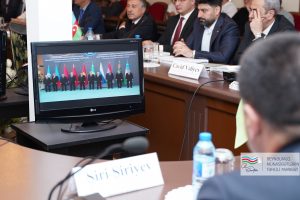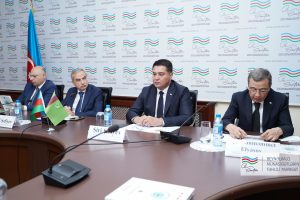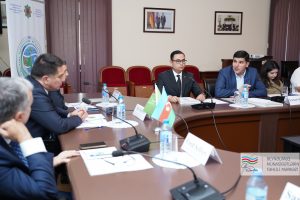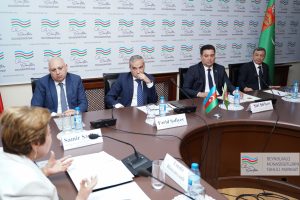On June 18, 2025, the Center for Analysis of International Relations (AIR Center) hosted a scientific-practical symposium titled “Multifaceted Cooperation between the Republic of Azerbaijan and Turkmenistan: Achievements and Prospects.”
The event brought together senior officials from the Foreign Ministries of Azerbaijan and Turkmenistan, members of parliament, diplomats, and representatives from various think tanks.
Delivering the opening speech, Ambassador Farid Shafiyev, AIR Center’s Chairman of the Board, emphasized that the relations between Azerbaijan and Turkmenistan are at a high level and continue to develop steadily. Farid Shafiyev noted that the cooperation between the two friendly countries, which share a common history, cultural heritage, and values, has entered a new phase in the fields of energy, transport and logistics, humanitarian issues, and international diplomacy.
“Currently, bilateral relations are progressing positively. In October, the Summit of the Organization of Turkic States (OTS) will be held in Baku. Traditionally, a forum of think tanks takes place as part of this event. We would be pleased to see our colleagues from Turkmenistan participate in these activities.”
In his speech, the diplomat highlighted specific examples such as Trans-Caspian cooperation, the joint development of the “Dostluq” oil field, and the Baku-Turkmenbashi transportation routes. He stressed that these projects hold strategic importance not only for bilateral relations but also for regional stability and economic integration.
Deputy Minister of Foreign Affairs Samir Sharifov emphasized that strengthening political dialogue with the Turkic world remains a key priority in Azerbaijan’s foreign policy. He noted that cooperation between Azerbaijan and Turkmenistan is not limited to a bilateral framework but is also manifested within regional and international organizations. In particular, the two countries support each other and present common positions within platforms such as the Organization of Turkic States (OTS), the United Nations (UN), and the Organization of Islamic Cooperation (OIC).
“Central Asian countries have consistently supported Azerbaijan’s territorial integrity, which has become one of the key factors in our political relations. At the same time, our economic cooperation is developing dynamically. Today, mutual trade between Azerbaijan and Turkmenistan is expanding, and cooperation in transport and logistics is strengthening. Azerbaijan has established strategic partnerships and alliances with Central Asian countries. President Ilham Aliyev’s participation as an honored guest in the Consultative Meetings of Central Asian states is a clear indicator of the high level of cooperation with regional countries,” the deputy minister emphasized.
Samir Sharifov also stated that, thanks to the strategic vision of the two countries’ leaders, Azerbaijan-Turkmenistan relations have entered a qualitatively new phase.
“The Declaration on Strategic Partnership signed in 2017 forms the foundation of these relations. The regular activity of the intergovernmental commission makes a significant contribution to deepening bilateral and multilateral ties.”
In his speech, Samir Sharifov also highlighted the considerable potential in areas such as Trans-Caspian cooperation, energy security, and the transition to green energy.




Qurbanmämmet Elyasov, Ambassador Extraordinary and Plenipotentiary of Turkmenistan to the Republic of Azerbaijan, stated that one of the main directions of Turkmenistan’s international cooperation policy is the consistent strengthening of ties with its brotherly country, the Republic of Azerbaijan:
“The relations between our countries are developing along an upward trajectory in the political, economic, transport-logistics, and oil and gas sectors. We highly appreciate Azerbaijan’s support for Turkmenistan’s initiatives on international platforms. Azerbaijan is a brotherly country to us, with a brotherly people, and we will continue to strengthen our ties consistently by utilizing all available potential.”
The ambassador added that, given the current geopolitical situation, Turkmenistan, as a neutral state, supports efforts to unify international actions and create appropriate political-diplomatic opportunities as a way out of the existing crisis:
“On this basis, during the 78th session of the UN General Assembly, Turkmenistan initiated the resolution titled “International Year of Peace and Trust, 2025” which was adopted with the co-sponsorship of 86 countries.”
According to Shiri Shiriyev, Director of the Center for Strategic Studies under the Institute of International Relations at the Ministry of Foreign Affairs of Turkmenistan, the experience of the past 30 years shows that Turkmenistan’s neutrality is not merely a foreign policy tool, but an active contribution and model for a more stable, just, and harmonious world:
“Turkmenistan’s neutrality is not simply a refusal to join blocs, but an effort aimed at creating conditions for sustainable development and partnership. In this context, it is worth highlighting the country’s key initiatives: supporting the resolution of the legal status of the Caspian Sea, backing the establishment of a nuclear-weapon-free zone in Central Asia, and advancing the TAPI (Turkmenistan-Afghanistan-Pakistan-India) gas pipeline.”
Shiriyev also noted that Turkmenistan actively participates in the development of international transport routes, including the Trans-Caspian corridor, as well as the “North–South” and “East–West” directions. He emphasized that Turkmenistan is firmly committed to its neutral status and uses it as a foundation for active foreign policy, diplomacy, and humanitarian efforts:
“One example is the humanitarian aid provided to Afghanistan during difficult times. Between 1998 and 2001, when drought and severe humanitarian conditions prevailed in Afghanistan, Turkmenistan, unlike other countries, did not close its borders, rather it became a humanitarian bridge. Aid was delivered through the Imam Nazar and Serhetabat border crossings, including with the support of the World Food Programme,” he added.
Later, the first panel analyzed Azerbaijan-Turkmenistan multifaceted cooperation from various perspectives. Member of the Milli Majlis and Chair of the Azerbaijan-Turkmenistan Interparliamentary Working Group Tanzila Rustamkhanli, expert on transport and logistics Rauf Aghamirzayev and AIR Center’s leading advisor Roza Bayramli shared their insights on transport corridors in the Caspian region, joint use of energy resources, and prospects for cultural-humanitarian cooperation.
The second panel featured AIR Center’s Board Member Javid Valiyev, Head of the Center for the Studies of the South Caucasus Farhad Mammadov, and political analyst, historian, and TV host Teymur Atayev. They explained the significance of the neutrality concept in the context of international law and diplomacy.
The event concluded with a question-and-answer session.
